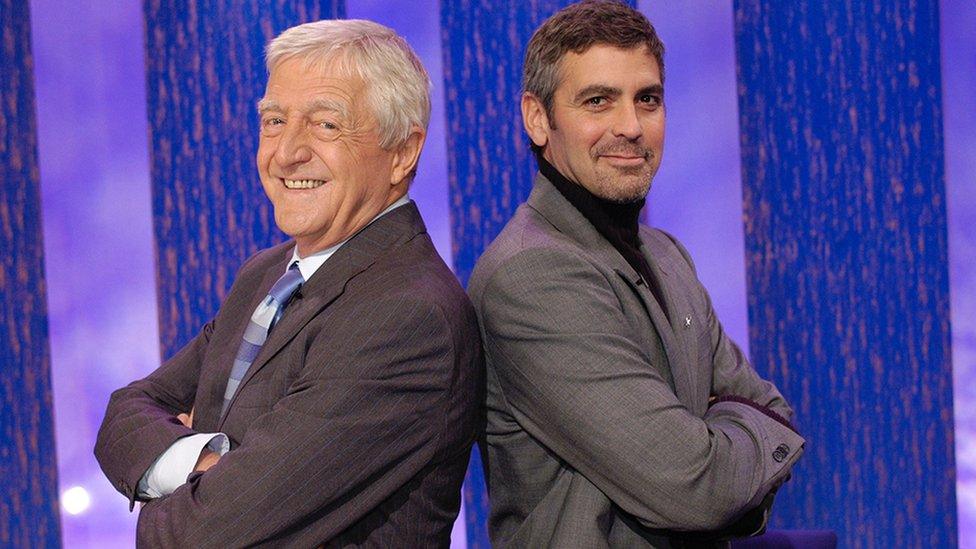Michael Parkinson obituary: Setting the standard for TV talk shows
- Published
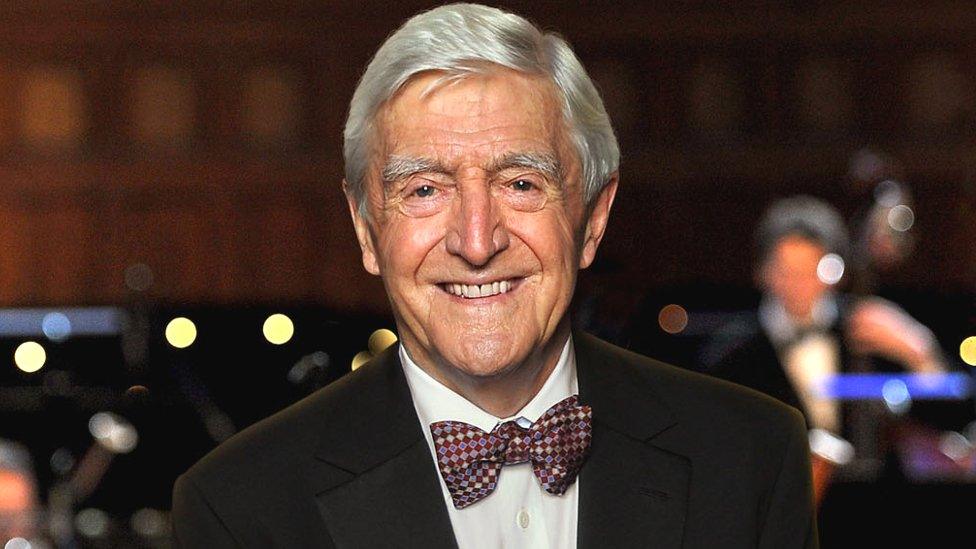
Michael Parkinson's gentle but probing style set a standard for television chat shows that has rarely been equalled.
In a remarkable career, he interviewed some of the most famous people in the world, including many of the Hollywood stars he had idolised as a child.
His interviews always adhered to his own rigorous journalistic standards and he was insistent that his guest, not himself, should be the star of the show.
He was at his best when he managed to winkle out sensitive details of a guest's life without appearing prurient.
He once famously defined a chat show as "an unnatural act between consenting adults in public".
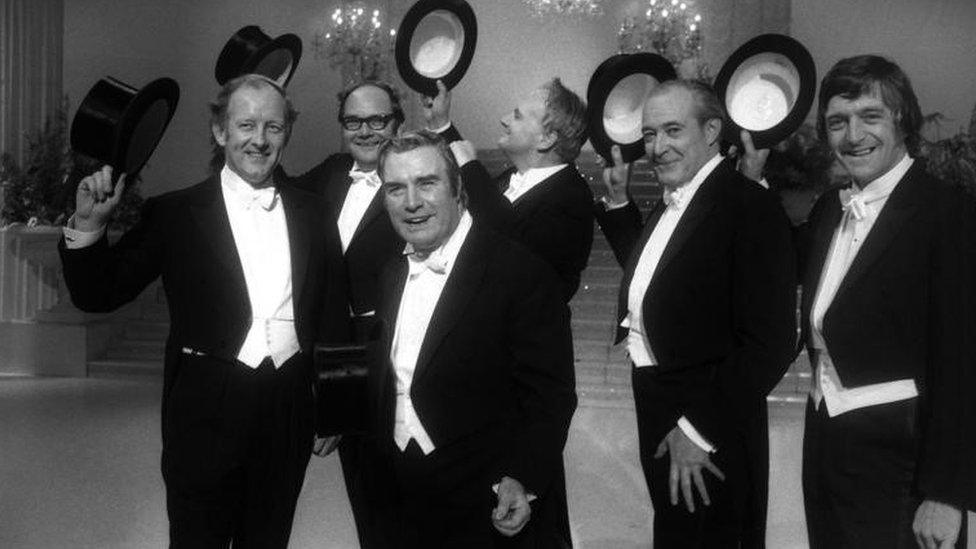
Parkinson (r) with fellow presenters in the 1971 Morecambe & Wise Christmas Show
Michael Parkinson was born on 28 March 1935 in the South Yorkshire village of Cudworth, the son of a miner.
His father was a great believer in self-improvement and the young Parkinson was encouraged to go to the local Working Men's Club where he read copies of the Manchester Guardian, a paper for which he would later write.
Parkinson senior was also determined that young Michael would not follow him down the pit. To that end he took his son down into one of the narrowest seams in Grimethorpe Colliery, an experience that made Parkinson determined to seek an alternative career.
As a child in the days before television he used to go regularly to his local cinema, giving rise to a lifelong passion for film and its stars as well as a burning desire to marry Lauren Bacall.
Parkinson attended the local primary school before moving on to Barnsley Grammar School where he achieved just two O-Levels and discovered a talent for writing by providing essays for his class mates at half a shilling each.
Watch: Memorable moments from Parkinson's star-studded show
He also learned to play cricket, developing an aptitude for the game that saw him seriously consider becoming a professional.
While playing for Barnsley Cricket Club he attended trials for Yorkshire alongside the future umpire Dickie Bird and a young batsman called Geoffrey Boycott.
His modest academic achievements were enough to allow him to get a job on a local newspaper, helping to collate sports results.
'Kidnapped'
It was his National Service that finally got him out of the village and opened his eyes to the wider world beyond what he referred to as the "parochial" nature of his upbringing.
He had a successful stint in uniform, receiving a commission and becoming the youngest captain in the British army, seeing action during the Suez crisis.

Michael Parkinson (right) Elton John (left) and Rod Stewart are game for a laugh at a 1974 charity football match
His time as an officer also enabled him to move into social circles that might have remained closed to a young Yorkshire lad who left school at 16 and had never been to university.
After his return to civilian life he went to work for the Manchester Guardian which became simply, the Guardian, in 1959. In the same year Parkinson married Doncaster-born Mary Heneghan, to whom he had proposed on the balcony of the Grand Hotel in Scarborough.
Parkinson left the Guardian and began working in London for the Daily Express while Mary, who was pregnant with their first child, remained in Manchester.
Parkinson later recalled getting a phone call from his father to say that he had "kidnapped" Mary and taken her back home in order to ensure that the couple's first child, which his father assumed would be a boy, would be born in Yorkshire and therefore qualify to play cricket for the county.
His move into television came when he was invited to a screen test by Granada, which was commissioning a new current affairs programme.

Michael Parkinson with Bette Midler in 1979
Parkinson later reflected that he had never thought of television as a career: "We had a contemptuous, bemused view of television at the Guardian in those days. We believed it would go away."
Intending to go, purely so he could write a cynical newspaper piece on the upstart new medium, he was quickly swept up in what he referred to as the "theatrical excitement" of the television studio.
Credibility
He worked as a current affairs presenter and reporter for both Granada and the BBC and, in 1969, presented a late night film review for Granada during which he did an interview with Laurence Olivier.
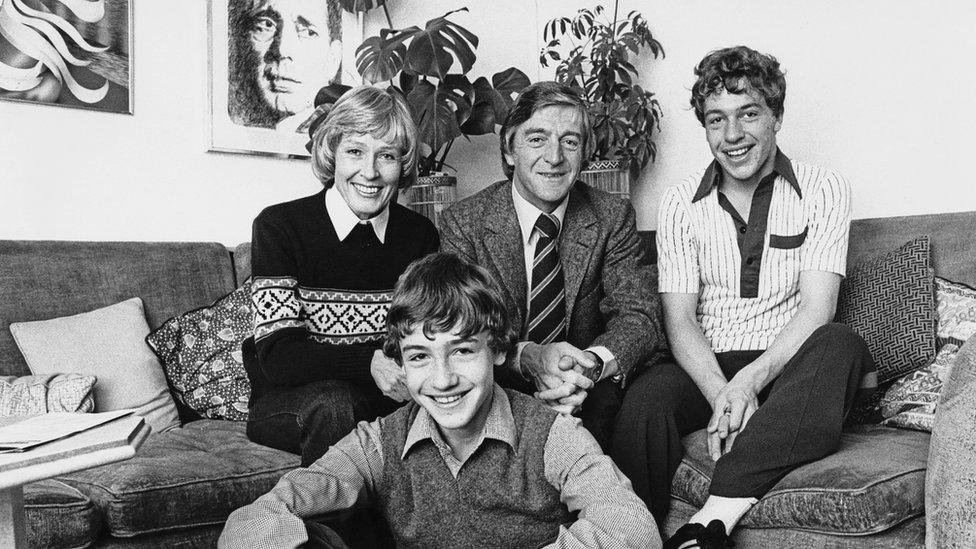
Michael Parkinson and family in 1980
When Parkinson was recruited to present his eponymous show on BBC One, the corporation's head of light entertainment, Bill Cotton, envisaged a variety programme along the lines of America's Ed Sullivan Show.
The initial run of shows all opened with Parkinson, somewhat self-consciously perched on a stool, cracking topical jokes, as well as featuring a resident singer, Marion Montgomery. It wasn't until the third series that the programme took on its now familiar format.
The show quickly became a success with audience-pulling appearances by Morecambe and Wise, and guests like Orson Welles giving it great credibility.
John Lennon, Michael Caine and Elton John were among the earliest people to appear on the show and Parkinson also featured some of the music hall stars he had seen in his home town of Barnsley, such as Tessie O'Shea and Sandy Powell.
"We had a duty in a sense, to preserve this part of our culture. We were in danger of letting it pass by and remain only in the memory of people who had seen them. That was the unexpected bonus of the show."
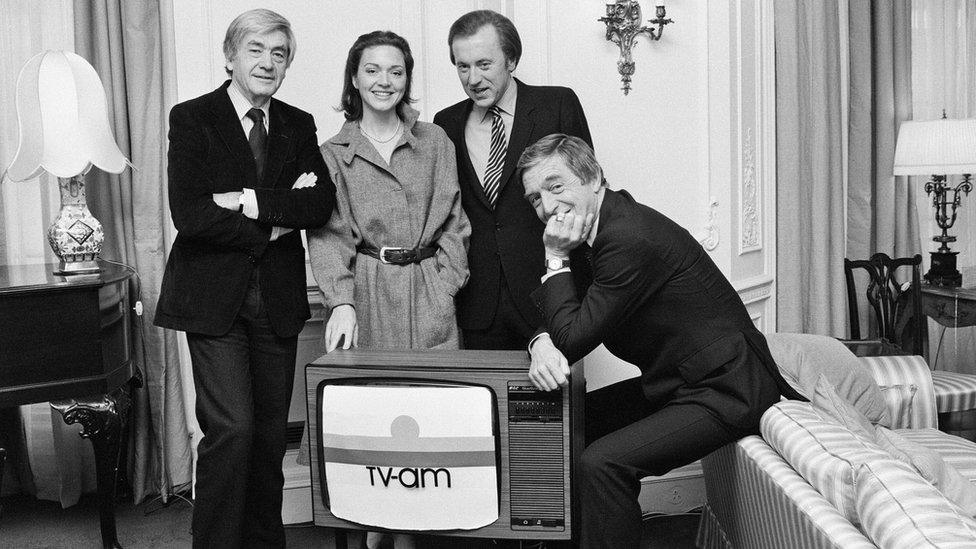
Michael Parkinson was part of the TV-am team with Robert Kee (left), Anna Ford, David Frost
The show conjured a host of memorable appearances - notably a monosyllabic Meg Ryan, the wisecracking Muhammad Ali, dubbed by Parkinson as his favourite interviewee, and an assault by Rod Hull's alter ego Emu, which had the host sprawling out of his chair.
Plain speaking
In 1983 he became one of the so-called "Famous Five" presenters who launched the new ITV breakfast franchise TV-am, where he presented the Sunday morning programme. However he, together with other big names, eventually departed after a very public row with the station's management.
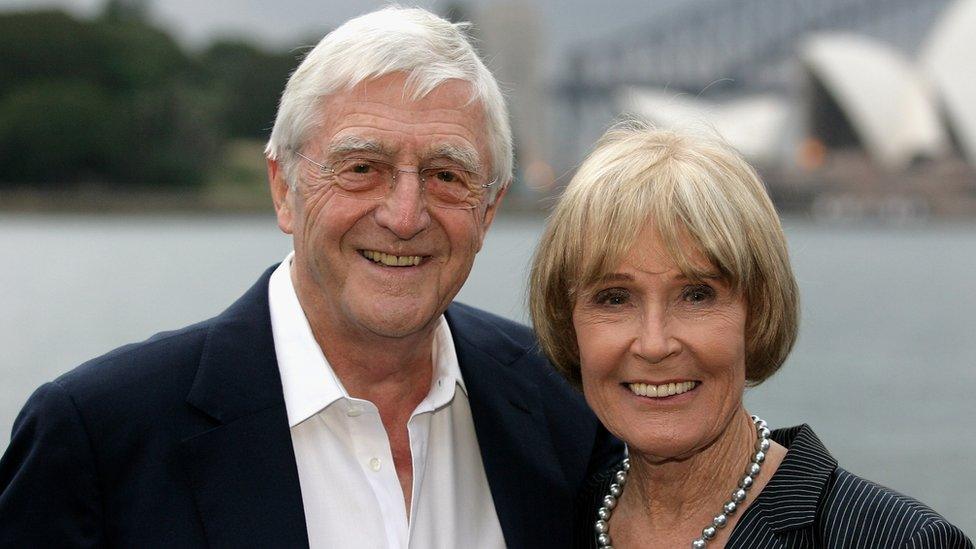
Michael and Mary Parkinson married in 1959
In 1985 he took the helm at Radio 4's Desert Island Discs, following the death of its creator, Roy Plomley. It was reported that Plomley's widow was unhappy with the Parkinson style and he handed over to Sue Lawley after just three years. He also had a spell as a presenter on Radio 2.
He continued to appear on television presenting, among other things, ITV's Give Us a Clue, and the BBC One programme, Going For a Song.
In 1998 his chat show returned to BBC One, although his style of questioning had become less probing.
In 2003 he fell out with the corporation's management who wanted to move his programme from its regular Saturday night slot in favour of Match of the Day. Parkinson took his show to ITV where he stayed until hanging up his hat as a mainstream TV interviewer in 2007.
He remained the plain-speaking Yorkshire man, causing something of a storm in 2009 when he described the recently deceased reality TV star, Jade Goody, as "a woman who came to represent all that's paltry and wretched about Britain today".
And, in an interview with the Radio Times, he bemoaned what he saw as the declining state of British TV, saying he was fed up with the rise of celebrities hosting shows, ridiculously titled documentaries and property programmes.
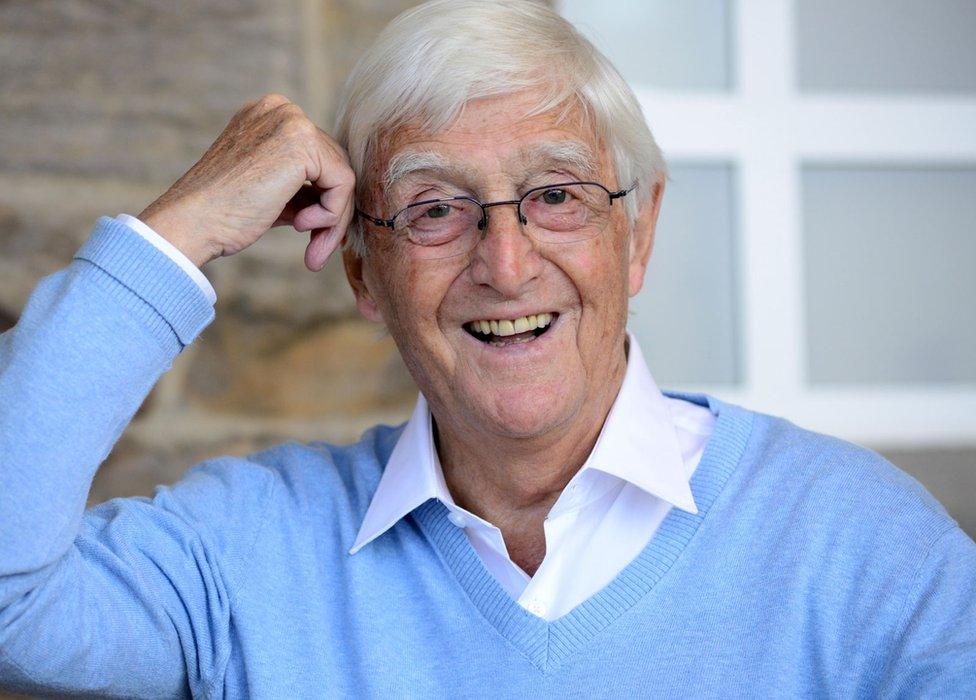
Parkinson was created a Knight Bachelor in the 2008 New Year's Honours.
At the end of his final Parkinson show he made a poignant reference to his father Jack, who died in 1975 following a battle with lung disease pneumoconiosis - caused by long-term retention of dust in the lungs.
Jack Parkinson had slightly mixed feelings about his son's chosen career, his son later revealed.
"Father loved coming to the show but he was never sure his son was doing a proper job. 'You've made a bob or two without breaking sweat,' he once told me. 'But, think on. It's not like playing for Yorkshire, is it?'"
Michael Parkinson agreed: "Of course, it wasn't. But, once or twice, it got pretty damned close."
The presenter suffered his own health problems in later life. He was diagnosed with prostate cancer in 2013, from which he recovered after an operation and radiotherapy. He was also plagued with a back condition for 11 years for which he underwent spinal surgery in 2017.
Parkinson couldn't quite give up his interviewer status and hosted a series on Sky Arts called Michael Parkinson: Masterclass from 2012 to 2014, featuring guests such as Jamie Cullum, Michael Morpurgo, Carlos Acosta and Lang Lang.
But with or without his own show, Parkinson remained a frequent face on the small screen as he himself became a popular guest on shows such as This Morning, Loose Women, The Graham Norton Show and Piers Morgan's Life Stories.
- Published17 August 2023
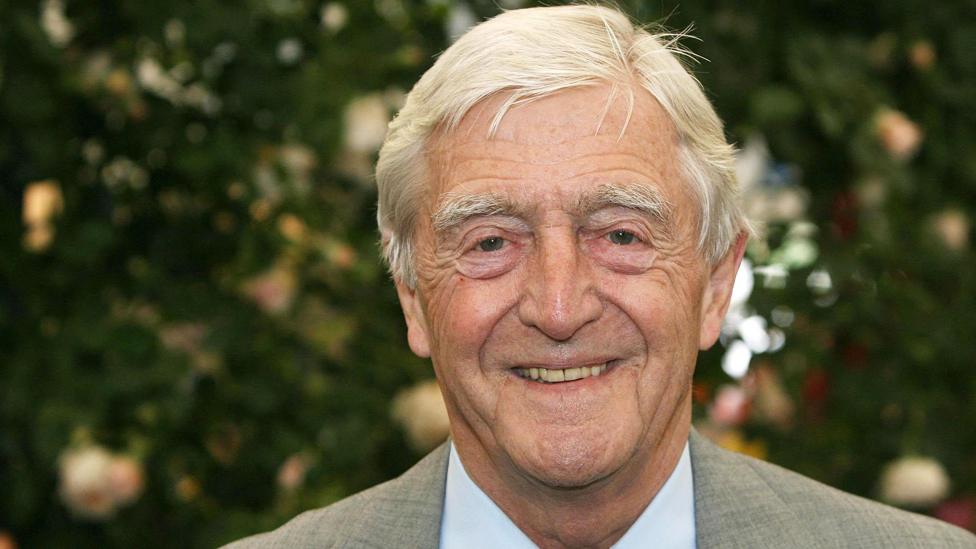
- Published17 August 2023
